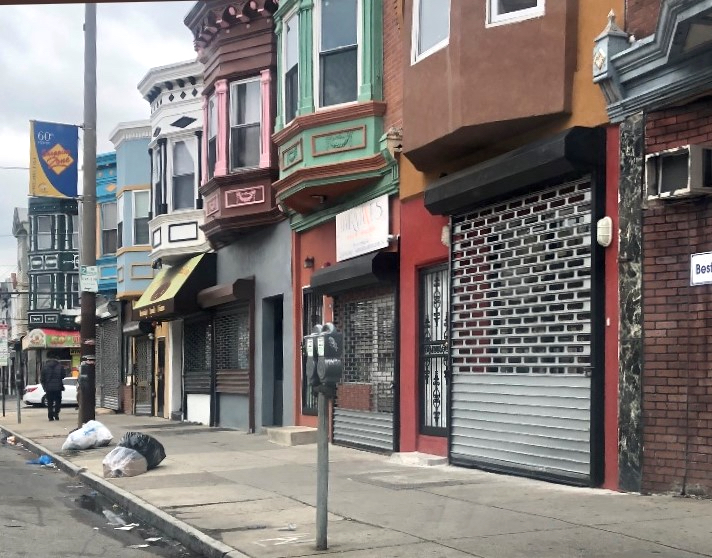Jabari Jones sounded courteous in discussing the events of Monday, Oct. 26, but his voice held a tone of anger when addressing the footage of another Black man’s murder by police.
“The video was so sickening,” West Philadelphia Corridor Collaborative’s president told Technical.ly via phone on Tuesday morning. “For the neighborhood, it was the one striking match to set us off. It was right here on 61st Street. The guy had mental health issues and they responded with excessive force. That video is reverberating all over the city and all over the country.”
The video Jones referred to is of West Philadelphia resident Walter Wallace Jr.’s killing by Philadelphia police. His death was the latest in a disturbing number of Black lives claimed by law enforcement. Wallace reportedly suffered from mental health issues and was seen holding a knife before he was shot to death by two police officers who arrived to address a 911 call.
In the days following the May 25 killing of George Floyd by police in Minnesota, protests erupted cities across the country. Philadelphia was affected in drastic way, with police using tear gas on West Philadelphia residents while several businesses were vandalized.
Jones and his colleagues at the West Philly Corridor Collaborative have worked extensively in the four months since June’s events to help local business owners rebuild and stabilize their businesses. Now, certain lessons he learned from the summer’s uprising are relevant again after last night’s events.

West Philadelphia Corridor Collaborative Chief Strategist Diamonique Robinson and President Jabari Jones at the first Technology Repair Pop-Up. (Courtesy photo)
While he sees a desire from some people to immediately help as much as possible, Jones said there’s a need to wait for things to subside before putting a plan in motion. He believes there will be additional nights of looting — some did occur on Monday — and that prospect is stressful for business owners who were just starting to get back on their feet.
“The businesses are feeling the real strain and this is the second time this happened in the course of four months,” he said. “People are saying, ‘We just rebuilt and this happened.’ The people still here are saying, ‘This might be me tomorrow.’ There is a sense of tension.”
As the West Philadelphia community mourns Wallace’s death, Jones hopes that people outside of the community don’t reduce it to the vandalism and theft that happened to its businesses.
“Don’t judge people by their worst moment, judge them by their best,” he said. “I think a lot of people have taken a stereotypical view of our community and saying we just destroy stuff and rob stores. While there is damage to our local economy, you have to have a human element and understand how that video sparked a lot of stuff.”
It’s a sentiment echoed by Candace McKinley, lead organizer for the Philadelphia Community Bail Fund, which raises funds for post bail for those who can’t afford it, including protesters in the past few months.
“I think property damage and ‘looting’ are both caused by the fact that the state and society at large refuses to hear and see Black communities who have long been disenfranchised, actively divested from, and over-policed and surveilled for hundreds of years in this country,” McKinley told Generocity. “Instead of the focus being on protesters looting or local business owners who are impacted, the focus and scrutiny should be on our leaders who continue to enable, encourage, and legitimize police violence against our communities and who continue to enact policies that are designed to keep us poor, sick, and disenfranchised.”

Candace McKinley. (Photo via Generocity)
In the coming days, Jones hopes that large companies with franchises and businesses in the area focus on the incident that set these events in motion. While there may be questions about whether they want to reopen stores along the corridor, he believes there is a greater need for their support in social justice and rebuilding efforts.
And affected small businesses, McKinley said, should also pause before thinking themselves as so different from those labeled “looters.”
“What are the government policies and budget allocations that will help you and your customer base thrive?” she said. “When ‘riots’ occur as a direct result of the state’s longstanding policies of over-policing, disenfranchisement, and divestment, what are the government programs to help you recover and rebuild? Why does this cycle continue to reoccur decade after decade? Why do you feel like you are living in a tinderbox? And who keeps drying your community out like kindling?”
Michael Butler is a 2020-2022 corps member for Report for America, an initiative of The Groundtruth Project that pairs young journalists with local newsrooms. This position is supported by the Lenfest Institute for Journalism.Before you go...
Please consider supporting Technical.ly to keep our independent journalism strong. Unlike most business-focused media outlets, we don’t have a paywall. Instead, we count on your personal and organizational support.
3 ways to support our work:- Contribute to the Journalism Fund. Charitable giving ensures our information remains free and accessible for residents to discover workforce programs and entrepreneurship pathways. This includes philanthropic grants and individual tax-deductible donations from readers like you.
- Use our Preferred Partners. Our directory of vetted providers offers high-quality recommendations for services our readers need, and each referral supports our journalism.
- Use our services. If you need entrepreneurs and tech leaders to buy your services, are seeking technologists to hire or want more professionals to know about your ecosystem, Technical.ly has the biggest and most engaged audience in the mid-Atlantic. We help companies tell their stories and answer big questions to meet and serve our community.
Join our growing Slack community
Join 5,000 tech professionals and entrepreneurs in our community Slack today!

The person charged in the UnitedHealthcare CEO shooting had a ton of tech connections

From rejection to innovation: How I built a tool to beat AI hiring algorithms at their own game

Where are the country’s most vibrant tech and startup communities?



